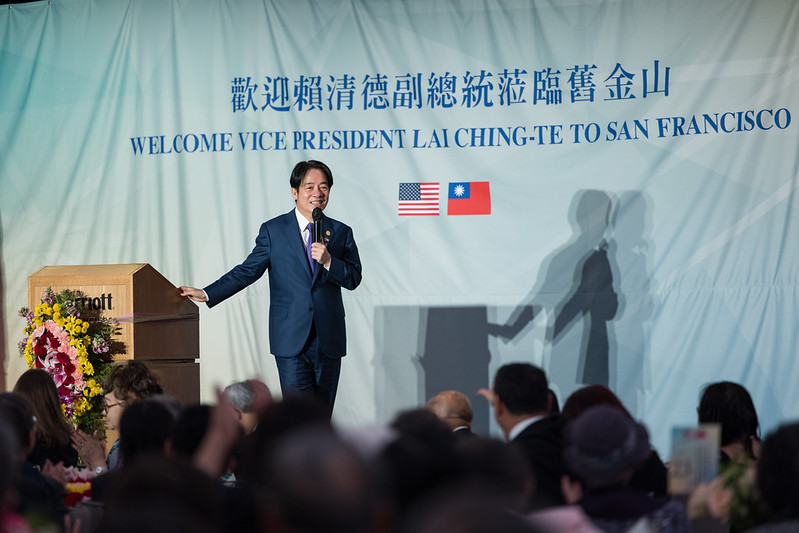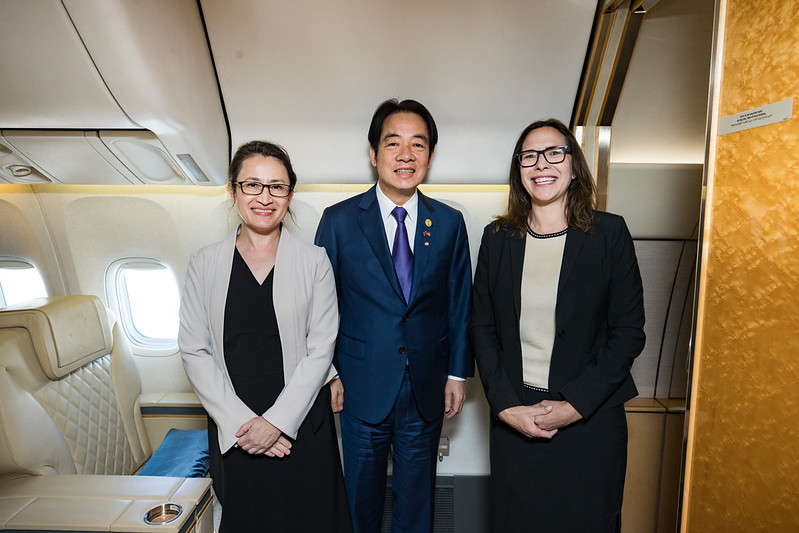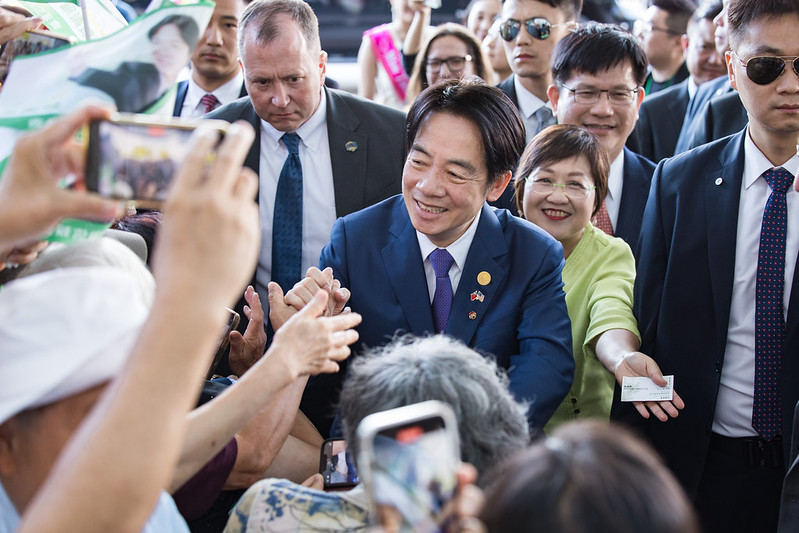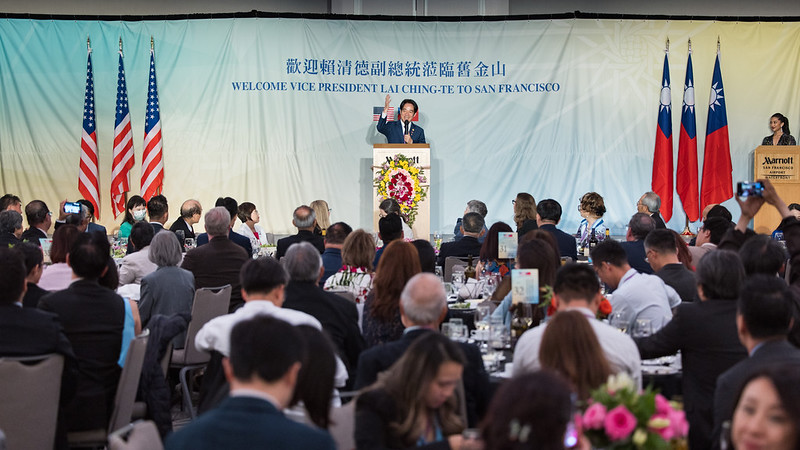News & activities
 News releases
News releases
On the morning of August 16 local time (evening of August 16 Taipei time) Vice President Lai Ching-te concluded his visit to Paraguay and boarded a return flight to Taiwan with a scheduled transit stop in San Francisco. After a 12-hour flight, in the afternoon of August 16 local time (morning of August 17 Taipei time), the delegation's chartered aircraft touched down at San Francisco International Airport, where Representative to the United States Bi-khim Hsiao (蕭美琴) and American Institute in Taiwan (AIT) Chairperson Laura Rosenberger boarded the plane to welcome the vice president. The vice president and his delegation were then driven to their hotel, where they received a warm welcome from members of our overseas community.
That evening Vice President Lai attended a banquet with members of the local and Taiwanese overseas communities, and thanked them for always standing with Taiwan. The vice president said that he looks forward to promoting his National Project of Hope to build a more innovative and prosperous Taiwan, and that taking peace as his North Star and democracy as his compass, he will continue to take Taiwan forward, cooperate broadly to engage with the international community, and make Taiwan the MVP of the global democratic community.
In remarks, Vice President Lai began by thanking the distinguished guests and overseas community members for sparing no effort to come to San Francisco and participate in the banquet that evening. He mentioned that the last time he was in San Francisco was at the beginning of 2022 during a stopover as President Tsai Ing-wen's representative, remembering that it was a very cold winter and that the COVID-19 pandemic was severe. Nevertheless, he recalled seeing many overseas community members on the streets of San Francisco waving our flags and shouting "Go Taiwan!" and "Let's go ROC (Taiwan)!" Even the thickest facemask could not conceal the smiles on every face, he added, and even from a distance you could feel everyone's passion. The vice president said that no matter how grave the situation, Taiwan's determination to forge ahead without fear and embrace the world remains undiminished.
The vice president said that for this trip to our diplomatic ally Paraguay, he was a special envoy representing President Tsai to congratulate President Santiago Peña Palacios of the Republic of Paraguay on his inauguration. He then thanked the US for providing assistance on his transit stops during the trip, for which it upheld the principles of safety, comfort, convenience, and dignity. On behalf of President Tsai, he also thanked members of the overseas community for their hard work and cooperation over the years, adding that the Taiwan-US relationship has never been better.
The vice president went on to say that for the overseas Taiwanese in the US, Taiwan remains in their hearts, and that when circumstances demand, they take it upon themselves to stand with Taiwan. That includes, he said, providing monetary and other assistance to address international issues, including the COVID-19 pandemic, Russia's invasion of Ukraine, and earthquake disaster relief in Türkiye. He said that overseas Taiwanese thus act as a bridge between the Taiwan government and the US, letting the world see Taiwan's economic capabilities and willingness to contribute to international society and that in the international community Taiwan is a force for good.
The vice president pointed out that San Francisco is one of the great cities of the US, and many Taiwanese have started or joined companies in San Francisco's Silicon Valley, a place that represents the American spirit of freedom and openness. That is why, he said, he chose to speak on the theme of "building a more innovative and prosperous Taiwan." He said that the innovation, prosperity, freedom, and openness that characterize the spirit of Silicon Valley have been an inspiration to many countries and people. That includes Taiwan, he added, saying that nearly 40 years ago many passionate and visionary Taiwanese engineers decided to return to Taiwan to plant their seeds, one of which grew into our semiconductor industry. And now, after several decades of watering and watchful care, that seed has now become a giant tree, he said.
Vice President Lai stated that Taiwan holds a 24.3 percent share of the global IC design market, placing Taiwan second in the world. In foundry operations and assembly and testing Taiwan's market share is over 50 percent globally, he said, making it first in the world. And Taiwan produces over 90 percent of the world's advanced semiconductors, also placing Taiwan first worldwide, he said. The vice president noted that Taiwan Semiconductor Manufacturing Company (TSMC) inaugurated its global Research and Development Center in Taiwan two weeks ago, and that TSMC Chairman Mark Liu (劉德音) has said that TSMC will continue to develop leading semiconductor technology and will explore 2-nanometer, 1.4-nanometer, and even more advanced process technologies. The vice president noted that 2-nanometer production facilities will be established in Hsinchu, Taichung, and Kaohsiung, while those for 1.4-nanometer production will be established in Longtan. That will mean Taiwan taking on an even bigger responsibility in advancing prosperity around the world, he said.
Pointing out that Taiwan's industry is more than just the semiconductor industry, the vice president said that we also have our industries in information and communications technology, passive components, precision machinery, metals, and textiles. The vice president noted how these industries have formed their own industry clusters in Taiwan, how they have continued to innovate, and how many have become hidden champions that play important roles in the global supply chain. He then gave several examples, saying that 36 percent of the iPhone's components in terms of cost are made in Taiwan, 75 percent of Tesla's automotive parts are provided by Taiwanese manufacturers, over 80 percent of the world's notebook computers come from Taiwan, and 90 percent of the global market for servers used in generative AI is held by Taiwan.
The vice president said he believes that the situation is now changing at a fast pace and that the global economic order is shifting toward fair competition, security and trust, net-zero emissions, and social inclusivity. He added that Taiwan must seize opportunities, understand these changes, and expand upon its own advantages to give itself an unassailable position for economic development. The vice president said he will promote his National Project of Hope to build a more innovative and prosperous Taiwan and further develop our economy.
Citing a saying in the technology sector that "the closest place to Silicon Valley is not Los Angeles or Seattle, but Taiwan's science parks," the vice president said that in the past this referred to Taiwan learning from the US model for technological development, but now it has come to mean that Taiwan's technology sector has become inextricably connected with global supply chains and that Taiwan now plays a more important role in this sector. He also noted that YouTube Co-founder Steve Chen (陳士駿) once said that Taiwan has the world's best engineers, innovators, and venture capitalists, and can become the next Silicon Valley. In addition to the advantages Chen mentioned, the vice president said that Taiwan has a democratic system, substantial capital, and the support of a complete technology supply chain that all make it an ideal place for innovation. He added that Taiwan's high-speed rail network has created a technology corridor with travel between all its destinations possible in a single day, which means that Taiwan can indeed replicate the Bay Area's Silicon Valley. He emphasized that by working together, we can turn Taiwan into Asia's Silicon Valley.
Vice President Lai said he was glad to see leaders from our overseas community as well as second- and even third-generation community members. He noted that the series A Taiwanese Tale of Two Cities tells the story of two characters – one located in Taipei's Dadaocheng, the other in San Francisco – who travel 10,382 kilometers to each other's homes in pursuit of their dreams and a new life. With this in mind, the vice president expressed hope that young second- and third-generation members of our community will travel to Taiwan more often to experience a different culture and way of life, the warmth of our sun, and the vibrance of our democracy. That series, he remarked, showed him that although Dadaocheng and San Francisco are far apart, they have a close connection, which made him think of how in recent decades, through the good times and the bad, Taiwan has stood shoulder-to-shoulder with the global democratic community and that Taiwan has never been alone.
Reflecting on Silicon Valley's vision of making the world a better place, the vice president said that with its own vision of democracy, peace, and prosperity, Taiwan can also make the world a better place. He then stated that with peace as his North Star and democracy as his compass, he will continue to take Taiwan forward, cooperate broadly to engage with the international community, and make Taiwan the MVP of the global democratic community.
Also in attendance at the event were National Policy Advisor to the President Chiu Chun-pang (邱俊邦), Secretary-General to the President Lin Chia-lung (林佳龍), Deputy Secretary-General to the President Alex Huang (黃重諺), Representative to the US Hsiao, Overseas Community Affairs Council Minister Hsu Chia-ching (徐佳青), AIT Chairperson Rosenberger, former US Secretary of Homeland Security and Director of the Center for Security in Politics at the University of California, Berkeley Professor Janet Napolitano, and Mayor of Phoenix Kate Gallego.












